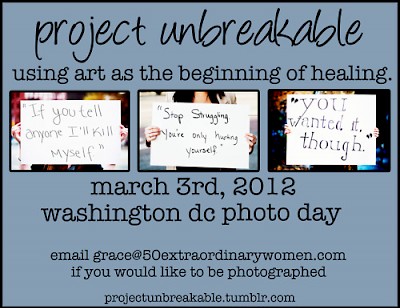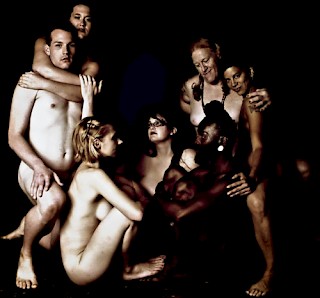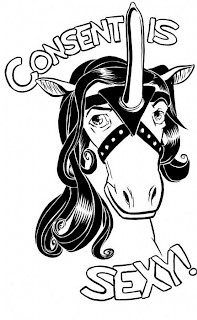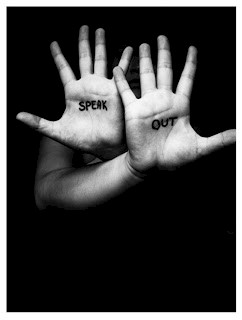Introduction: Safe/Ward is getting to be rather a massive project, with a lot of posts, so if you're so inclined, please check out the other posts in the series:
-I Never Called it Rape
-I Wish I Could Use a Safeword on Rape Culture
-A What You Can Do Guide for Community Members
-A What You Can Do Guide for Community Leaders
-Blog Carnival #1
-This is Why I Speak Up
-Shadows (about one of my experiences)
-Guest Post: Sex-Negative Actions in Sex-Positive Communities
There's a Salon article out right now. Maybe you've seen it- "When Safe Words are Ignored", safewords being those things that help people doing play communicate their boundaries while play is taking place (often after some discussion about what's going to be happening). There's a great response to the article here, by a male feminist who goes by Snowdrop. Maggie Mayhem has also responded here.
Anyway, this article. It's been taking the kinky internet by storm, and there's a lot of backlash... again. Surprised? Not remotely, except perhaps at the fact that some of voices rebutting us the loudest are... well, you guessed it, pillars of the community, like respected author and presenter Janet Hardy.
Janet originally commented on a Bay Guardian piece about the consent culture fundraiser Maggie and I did last week. I was honestly kind of shocked about what she said-
A bottom who has withdrawn consent and is not safewording is abusing his or her top, by turning the top into a rapist without the top's consent.
Moreover, if you are a bottom who is unwilling or unable to safeword, you are not a safe bottom to play with, any more than a top who ignores a safeword is safe to play with. At minimum, you need to tell your top up front that you have this disability, so that your top can choose whether or not they're willing to take the chance of playing beyond your consent.
While I think that in some ways Janet and I agree- that part of the problem is bottoms not safewording when they should- I think that what we believe should be the response to that is vastly different. I've played with someone and they didn't safeword and turned out to have had an awful time, and it sucked, I felt awful, and, at first, I was pissed off at the bottom for not telling me what was going on. But then I reflected on it. Why didn't she tell me? Did she want to please me? She had a trauma history- did I trigger her without either of us knowing until it happened? Did the culture we lived in give the impression that safewording showed weakness? I didn't blow it off as "oh, she's just an unsafe bottom to play with"- I began to realize when I unraveled the situation that the kink culture has some deep underlying issues around consent, sometimes.
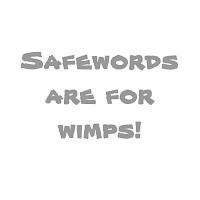
When I bottomed, I know I used to hear Doms tell me that they were proud of me for not safewording, or that true submissives don't safeword, that safewords were for tourists. We need safewords, was the general consensus among people I met, but they're kind of a killjoy.
Hm.
I have safeworded and had it ignored, and I have not safeworded because they had violated our very clear agreement, I was afraid for my safety, and why bother, if they were going to rape me they were going to rape me. Safewording and having it ignored was endlessly more traumatic. It proved that they were only as good as the respect the other person had for them, and for me- and that a predator can wear a very convincing mask, until they don't want to anymore.
As a Domme now, I worry about whether or not bottoms I play with will be able to let me know if their boundaries are being crossed. I'm also aware enough to know that things can go pear-shaped and it's no one's fault. Trauma responses and triggers can manifest after years of being shut away. Not everyone feels safe saying they've been assaulted in the past. I can only do the best I can do, and if that's not enough, then I deal with the fallout.
 |
it's ok to joke about,
cause it's a female dominant! *cough* |
I admit here, often, that I am not perfect- that I have been and can be manipulative sometimes, that I worry about my controlling nature and wonder if it's always coming from a healthy place. But I would never, ever say the bottom is just unsafe to play with- that would effectively encourage them to keep being silent! I would take responsibility for my part, and ask them how I can help them feel safe now. That seems obvious to me, but maybe it isn't.
As I told Tracy in part of the interview that she didn't use, nobody likes safewords. It sucks having to use one, and it sucks hearing one from your partner. They are, however, an incredibly useful tool for facilitating extreme play (especially play with the fantasy or appearance of nonconsent, where "no no!" may mean "hell yes!"), a firewall that divides abuse from Eros - so we use them anyway, and I only wish that the non-BDSM world would do the same.
Many longtime partners haven't needed one in years, because they know one another's reactions well enough that they can back off before matters get to that point... but anyone who plays with someone new, or does extreme play with a flavor of adversarialism or nonconsent, is playing with a particularly nasty kind of fire.
-Janet Hardy- read the comments on Salon here for full context
"Nobody likes safewords". I find that an interesting attitude to have, personally. Because if even a community leader is saying that safewords are sucky, then that adds to the issue I want to talk about further- this attitude that being at a safe place where playing without a safeword is perhaps more intimate and more desirable. And if that is the attitude, does that not promote an unspoken attitude that while playing with safewords is important and safer, playing without them is desirable?
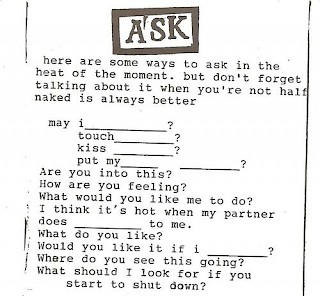 Like with condoms- if you say "everyone hates condoms, but, you know, they keep you safe. However, people who trust each other sometimes become fluid-bonded", you're not saying that condoms are bad, but you're saying that without condoms might well be better. I mean, I spend a lot of time people how to enjoy negotiating in a way that's both sexy and effective, and how to have hot safer sex discussions and practices- I think that making safer measures part of foreplay is an important aspect of this discussion. And hey, look at that, I like safewords and condoms. Coincidence? I think not.
Like with condoms- if you say "everyone hates condoms, but, you know, they keep you safe. However, people who trust each other sometimes become fluid-bonded", you're not saying that condoms are bad, but you're saying that without condoms might well be better. I mean, I spend a lot of time people how to enjoy negotiating in a way that's both sexy and effective, and how to have hot safer sex discussions and practices- I think that making safer measures part of foreplay is an important aspect of this discussion. And hey, look at that, I like safewords and condoms. Coincidence? I think not.
Sure, I can appreciate that people want to feel like they're in sync sexually, that unspoken communication is enough- and it's certainly possible to have that rapport with a partner. But how long do you need to know someone before that rapport is something you can trust? What signifies that you've done that legwork? How does one get to that safe place?
You shouldn't even be having SEX, much less any sort of power exchange, if you don't know who you are and how you expect to be treated...
The community provides LOTS of resources, from books, to Fetlife groups, local munches, discussion groups, and educational events. Virtually every state has at least one, if not multiple educational conferences a year, most run by intensely ethical people whose mission is to educate. And I don't know of a single one that hasn't banned people for inappropriate behavior. Newbies don't get in trouble because nobody offers to teach them...but they often do when they refuse to take the time to learn, to observe, and to develop relationships and friendships with people of integrity and real knowledge before diving in.
-read Assent Matters on fetlife for full context
Again, there's this expectation that if you do enough work, you'll be prepared and these things won't happen to you- or, if they do, you'll be the perfect victim. Who can possibly say when you know yourself enough to give full, enthusiastic consent? We don't live in a vacuum, here! To expect that no one will have sex until they are completely self-aware- well, fuck, I guess I should stop, then, cause I haven't reached enlightenment. I'm still figuring out who I am. Isn't, well, everyone? "Who you are" and "what you want" is often somewhat fluid.
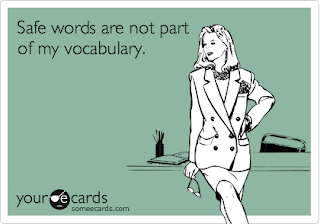 |
| haha, funny right? not so much. |
I was told that in my case I didn't do a good enough job getting to know my first Dominant rapist- I had gotten references, I had taken time to get to know him (months, mind), I had safecalls and safewords in place and several play sessions under my belt before I ever let him tie me up. I was told, am still being told, over and over again, often by women who have themselves been abused, that I exercised poor judgment, that I didn't do enough to protect myself.
So when do you know someone, exactly? If a couple of months of getting to know this person, and three one on one dates with all the "correct" precautions in place isn't enough for bondage, what is? Six dates? Ten? If having several references isn't enough, how many is appropriate to be exercising good judgment? Should you only play in public? Are public spaces safe? What do you do when the abusers are friends with the DMs, or, worse, the DMs themselves?
I know of at least two conferences that have not banned someone from presenting despite getting feedback that the presenter was abusive- both cited not wanting to get involved in personal issues as their reason. And, as I keep hearing, we don't have any tribunal, any way to sort through these issues in a way that's not biased, so spaces muddle through dealing with consent issues individually, not communicating with each other, each one making its own choice. I've seen both members of an abusive relationship banned from a community space in the interest of "avoiding drama", even though legal orders were in place. I've seen spaces ban the abuser. I've seen mediation happen, as well. I've unfortunately seen the abuser be allowed to stay and the victim told to leave because the abuser was well-liked by the right people.
I also keep hearing the argument "well, this stuff happens in all communities, so..." Yeah, this is true. Entitlement culture is everywhere- churches, schools, the police, the government, swingers, and, yeah, the kinky community. Except those other communities don't underline the idea of consent all the time. Safe sane and consensual, or its buddy, risk-aware consensual kink, share the idea that consent is pretty important, hence why it's something we're trying to bring some light to.
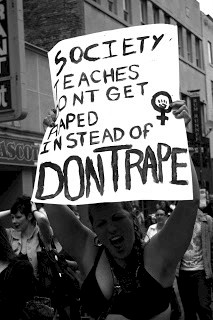
It's fascinating how defensive people are about this idea, though. We agree that rape is bad, yes? And less of it would be good? So why then not discuss ways that consent can be treated like it's important in this scene? I'm all for personal responsibility, and safewords, and also not blaming victims and not creating a culture of isolation and slut-shaming. Isn't that a good thing? More to the point, I'm not just complaining- I'm actually proposing things communities can actively do to be more supportive. Why on earth is that being treated as an offense, exactly?
Worst of all, many of these community members seem to be pointedly ignoring that most rapes happen with someone you know. Not a stranger. Someone you know, often well. So what then, exactly? How do you combat this issue when some of the predators are the ones in charge? And doesn't that sound an awful lot like the way we as a society generally respond to rape..?
When we live in a world where fake, melodramatic rape accusations outnumber real rapes, then maybe we can have a discussion about worrying about that. But as of now, suggesting that people should deal with it internally, suffer being blamed and silenced, and be nice about it in the name of avoiding so-called "he said she said drama" means actively that real abuse is being ignored and enabled. And that is actively dangerous. Would you tell people who have been raped in any other setting not to report unless they're the perfect victim and have perfect proof? Are you suggesting that the police are perfect at dealing with these situations, especially if kinky sex is or has been involved?
I was with a woman a month ago who reported rape to the police. It was someone she knew, and had a kinky relationship with once upon a time. We went to the hospital and waited for hours to be told we were in the wrong place but that the station was ready for us and had a female officer to talk to. Then we went to the police station, where we spent a total of 5 hours locked in a room- a room locked on the outside- while the all-male cops made statements that suggested she was somehow at fault. She, trying to do the right thing, didn't wipe when she peed or shower from when the assault happen to when we got to the hospital- where she was given a rape kit 12 hours after we started the whole process. At that point, of course, the kit showed nothing.
There was no case- not because of anything she did, but because of bureaucracy and police fuckups. Had I not been with her supporting her, she would've dropped it anyway, simply because of the way to cops talked to her (and as a witness, they were pretty fucking awful). The pamphlet with info on what to do after a sexual assault? All the numbers and links were no longer valid. That's what we're dealing with, here.
All I could think was "if this had happened in a dungeon..."
DMs aren't trained in first response. You're told as a victim that we can deal with these things among ourselves, we don't need to talk to the cops (cause in many places the cops will already be suspicious of kink generally- see Paddleboro). And then we don't deal with it- we leave victims to drown on their own, keeping quiet because, well, you don't want to be ostracized, do you?
Why are people reacting so poorly to this? I suspect that it's because when you really sit and think about it, as Maggie and I did months ago when we started this project, about how many dimes you would have if you had a dime for every time you were sexually assaulted within the kinky community... well, you'd have a hell of a lot of dimes. And if you took one away for each time you told someone, you'd probably still have a lot of dimes. And if you put back a dime for each time you told someone but didn't call it rape?
Yeah. It fucked with our heads too. Because if you have safewords in place, and respected references, and the person is well-liked by the community and seems good at what they do (maybe even presents workshops), and you've negotiated and read all the books and done all the stuff you're "supposed" to do, we expect that these things won't happen. That we're safe. And sadly, that is not the case. I don't think we, as a "community", want to hear that, because it is fucking terrifying.
A lot of this is wrapped up in the fact that, as Maggie said to me, "we're a community until something goes wrong- then, we're all individuals". That's really interesting to me from a culture standpoint, and I'll be writing more on exactly that soon. How can I in good faith say to radical feminists "no, you don't understand, kink isn't abuse because of consent and safewords and our focus on mutual respect" when, in fact, the community for the most part has proven me utterly wrong? Keep an eye open for a post on community, "community", and what that means for accountability.
This is why I'm so angry. Because if I wasn't angry, I think I would lie down in the fetal position, so consumed by depression and sadness that I'd give up. And I can't give up. We can't give up.

